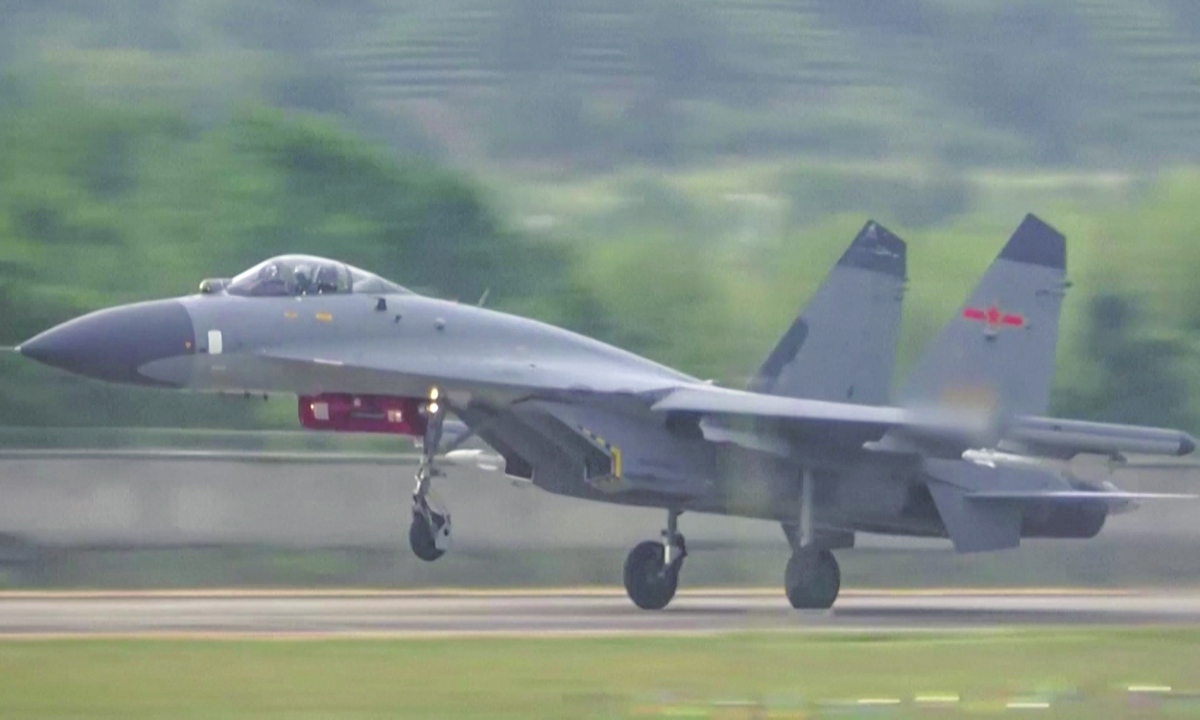
A J-11 fighter jet takes off in the realistic combat-oriented joint exercises launched by the PLA Eastern Theater Command around the island of Taiwan on August 3, 2022. Photo: VCG
The island of Taiwan has been an integral part of China's territory since ancient times. However, Democratic Progressive Party (DPP) authorities, who have adopted a separatist stance, refusing to recognize the one-China principle, distorting and denying the 1992 Consensus, have even colluded with external forces in successive provocative actions designed to divide the country.
From inviting foreign anti-China politicians to visit Taiwan in a vain attempt to raise the international visibility of the Taiwan question, to launching an information war on public opinion against the Chinese mainland, promoting "de-sinicization" while hyping the "mainland hegemony theory" to brainwash the Taiwan people, and to exert extreme pressure on those who advocate cross-Straits friendship and exchange... Observers pointed out that the DPP has tried every trick to obstruct China's reunification process, but it is bound to fail in the end.
Today, the situation in the Taiwan Straits is grave and complicated. The root cause is the DPP stirring up trouble by colluding with foreign forces. Some DPP members boasted that US and Japanese defense officials paid successive visits to Taiwan, highlighting "the importance of Taiwan's strategic position." However, analysts pointed out that the truth is that these external forces are using Taiwan as a pawn to obstruct the rejuvenation of the Chinese nation, undermining China's development and progress.
Some DPP members boasted that US and Japanese defense officials paid successive visits to Taiwan, highlighting "the importance of Taiwan's strategic position."?However, analysts pointed out that the truth is that these external forces are using Taiwan as a pawn to obstruct the rejuvenation of the Chinese nation, undermining China's development and progress.
While DPP authorities have constantly purchased outdated weapons from the US to reinforce its armed forces with the intention of pursuing "independence",?they are also trying to portray themselves as the perfect victim, accusing the mainland of coercion, pressurizing Taiwan island, and unilaterally changing the status quo, working with the radical separatists in and outside the DPP to lobby for amendments to their "constitution" and "laws," further inciting hostility against the mainland and cracking down on people in Taiwan who support friendly cross-Straits exchanges.
In addition to joining with external forces, the DPP has also attempted to hoodwink people in the Taiwan region and even around the world by employing internet ghostwriters and using agenda-driven media and so-called NGOs and research institutions to keep propagating "Taiwan independence" and discrediting the mainland.
On the island, the DPP constantly presses for "de-sinicization" and promotes "incremental independence", through revising history syllabus asserting that Taiwan and the mainland should not be subordinate to each other, and proclaiming a new "two states" theory.
Actually, for a long time, especially after US House Speaker Nancy Pelosi's provocative visit to the island, the people in Taiwan have grown angry and lost confidence in the face of the DPP's deceitful behavior, and no longer trust the US emphasizing on the "rock-solid relationship between Taiwan island and the US," Hung Hsiu-chu, a former head of the Kuomintang told the Global Times in a recent interview.
Experts said that the actions of the DPP authorities have resulted in tension of cross-Straits relations, ultimately harming the interests and well-being of the people on both sides of the Taiwan Straits.
After the 18th CPC National Congress in 2012, China's Communists, under the leadership of Xi Jinping, took a holistic approach to cross-Straits relations in keeping with changing circumstances, added substance to the theory on national reunification and the principles and policies concerning Taiwan, and worked to keep cross-Straits relations on the right track. The CPC developed its overall policy for resolving the Taiwan question in the new era, and set out the overarching guideline and a program of action.
Since the 18th National Congress of the Communist Party of China (CPC), the CPC and the Chinese government have facilitated dialogue, consultations, and in-depth exchanges of views on cross-Straits relations and the future of the Chinese nation with relevant political parties, organizations, and individuals in Taiwan. While countering interference and obstruction from separatist forces, the CPC and the Chinese government have called on the people of Taiwan to promote effective and in-depth cooperation and people-to-people exchanges in various fields across the Straits.
Having overcome the impact of COVID-19, the two sides of the Straits have held a number of exchange events such as the Straits Forum, and maintained momentum within cross-Straits exchanges and cooperation.
As the overall strength and international influence of the mainland has continued to increase, its influence over and appeal to Taiwan society will also keep growing.
Taiwan belongs to all the Chinese people, including the 23 million Taiwan compatriots. The Chinese people are firm in their resolve to safeguarding China's sovereignty and territorial integrity, and this resolve and commitment will frustrate any attempt to divide the country.




